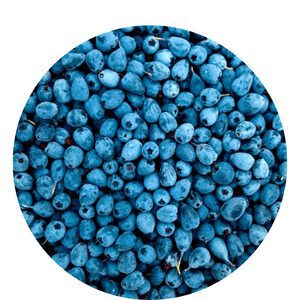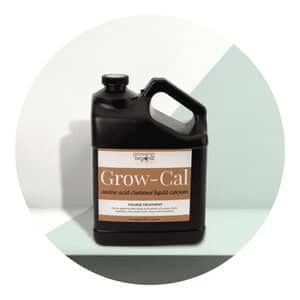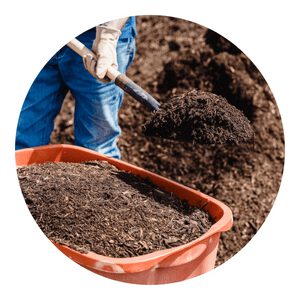The Best Organic Fertilizer for Blueberries
Organic farming is becoming increasingly popular as people become more aware of the environmental and health benefits associated with it.
When it comes to choosing the best fertilizer for growing blueberries, organic options are often the best choice.
Many organic fertilizers provide a balanced blend of essential nutrients that promote healthy growth, while also being safe for the environment.
In this article, we will discuss the different types of organic fertilizer available for blueberry plants, as well as the advantages and disadvantages of each type.

Blueberries Fertilizer Menu
The benefits of using organic fertilizers for blueberry plants
Organic fertilizers are becoming increasingly popular among gardeners because of their ability to provide essential nutrients to plants without the use of synthetic chemicals.
Organic fertilizers can be used to boost the fertility and health of blueberry plants, resulting in more bountiful harvests.
Organic fertilizers are made from natural materials such as compost, manure, soil conditioners and other plant-based products.
They work by releasing slow but steady doses of key components such as nitrogen, potassium and phosphorous that help promote healthy growth in blueberry plants – all without using harsh chemicals.
Additionally, organic fertilizers can help improve soil structure which helps increase water retention for a healthier root system that is better able to access vital nutrients.
The different types of organic fertilizers
Organic fertilizers are a great option for gardeners looking to provide their plants with the nutrients they need to thrive.
Organic fertilizers are derived from natural sources, and each type has different benefits and drawbacks depending on what your gardening needs may be.
Compost is made from decomposed plant matter and can be used as both a fertilizer and soil amendment.
It provides essential nutrients like nitrogen, phosphorus, potassium, calcium and magnesium that help provide beneficial microbial activity in the soil which in turn helps to promote healthy root growth for your plants.
Manure is also a good source of organic fertilizer as it contains high levels of nitrogen that feed the soil’s microbes which break down the organic material into usable nutrients for plants.
The importance of choosing a fertilizer with the right nutrients for blueberries
When it comes to choosing the best fertilizer for blueberries, understanding the key nutrients needed for growth is essential.
Nitrogen, phosphorus, and potassium are three of the most important nutrients for blueberry plants, and selecting a fertilizer with an appropriate ratio of these is critical.
Nitrogen helps promote leafy growth and healthy foliage; phosphorus promotes strong root systems and flowering; and potassium helps improve fruit quality.
A good organic fertilizer should provide all three of these key nutrients in balanced proportions to help ensure successful development of the plant.
Without adequate nitrogen, phosphorus, and potassium levels in the soil, blueberry yields can be severely compromised.
A slow-release fertilizer should also be chosen so that its nutrients are gradually released over time rather than all at once which can lead to nutrient deficiencies or imbalances in your soil.
Your thirst for blueberry is what brings you our way Rising early for toil, we’ll make sure you get your berry today We know no better way of growing sweets Than Organic Fertilizer, ready for your plants to eat No soil too dry or barren land Our feed lays the foundations 'neath a gardener's hand Rich in vitamins and texture too Nowhere else you’ll find ingredients so true A plant thriving with roots that soon can spread up high With organic feed, it’s easy to watch your berry patch die. So come now and gain tips to quench this cravings thirst Get The
Chappy The Gardener
The benefits of using compost as an organic fertilizer
Organic fertilizers are a great choice for gardeners looking to improve soil structure and fertility.
Using compost, in particular, is a great way to ensure soil health and encourage healthy growth in blueberry plants.
Compost is an excellent organic fertilizer option because of its ability to provide essential nutrients while also adding beneficial microorganisms that help improve the soil’s structure and fertility.
The nutrient content of compost varies depending on the type of material used.
Generally speaking, compost provides nitrogen, phosphorus, potassium, calcium and magnesium – all essential macronutrients for plant growth as well as micronutrients such as boron and zinc which are necessary for healthy plant development.
In addition to these nutrients, compost also adds important organic matter which helps increase water retention capacity of soils and improves drainage by improving air spaces within the soil profile.
The various types of manure that can be used as organic fertilizers
Organic fertilizers are a great way to nourish your blueberry plants, and one of the best types of natural fertilizers is manure.
Manure is derived from animal waste, and can provide your blueberry plants with essential nutrients for optimal growth.
The most commonly used manures for plants include cow, horse and chicken manure.
Each type of manure offers different benefits, so it’s important to understand the differences between them in order to choose the right type for your blueberry bushes.
Cow manure is high in nitrogen content, which helps promote foliage growth in plants like blueberries.
Horse manure contains potassium and phosphorus which are vital components of fertilizer that aid in photosynthesis and root development respectively.
Chicken manure has an extremely high concentration of nitrogen as well as additional micronutrients such as magnesium and zinc that help support healthy fruit production on blueberries.
Plant-based organic fertilizers
Organic fertilizers are an important component of a healthy gardening and farming system.
Plant-based organic fertilizers, such as alfalfa meal and bone meal, provide essential nutrients to soil that can increase yields and improve the health of plants.
Alfalfa meal is rich in nitrogen, while bone meal is high in phosphorus and calcium.
Both are excellent sources of slow-release nutrients that can help keep blueberry bushes producing abundant fruit year after year.
Alfalfa meal is an ideal fertilizer for blueberries because it helps to add nitrogen to the soil without burning roots or foliage.
It also provides trace minerals like magnesium and sulfur, which are essential for healthy plant growth.
Bone meal contains phosphorous as well as calcium which helps promote strong root systems so plants can better withstand cold temperatures, drought conditions, and other environmental stresses.
Tips for determining the right amount of organic fertilizer
Organic fertilizers provide blueberry plants with the nutrients they need to grow and produce juicy, delicious fruit.
But it can be tricky to know how much fertilizer is the right amount.
If you apply too little, your plants won’t get all the micronutrients they need.
Too much fertilizer can cause nutrient toxicity, leading to plant stress and reduced yields.
Here are some helpful tips for determining the right amount of organic fertilizer for blueberry plants.
First, make sure you use an organic fertilizer specifically designed for blueberries that states on its packaging that it meets the NOP (National Organic Program) standards for certified-organic products.
Then follow the directions closely according to your soil type and other environmental factors like pH level and climate zone.
The importance of timing when applying organic fertilizers to blueberry plants
Organic fertilizers are an important part of keeping blueberry plants healthy, but the timing of when to apply them is just as essential.
Applying organic fertilizer at the wrong time can have a negative impact on blueberry growth and productivity.
Properly timed applications help ensure maximum benefits for your blueberry plants.
The best time to apply organic fertilizers is during early spring while the plant is starting to grow and when the soil is still cool.
If applied too late in the season, it won’t be able to absorb all of the nutrients in the fertilizer which can result in poor results or even damage to your plants.
Additionally, applying it too early may cause some nutrient elements like nitrogen and phosphorus to leach away before being absorbed by your plants; this can also lead to poor results or even damage your plants.
The potential drawbacks of using organic fertilizers
Organic fertilizers can be a great choice for blueberry plants, offering numerous benefits.
However, there are potential drawbacks to consider when deciding which fertilizer to use.
One of the potential drawbacks is that these types of fertilizers may require more frequent applications than synthetic fertilizers.
Organic fertilizers break down faster, so they need to be reapplied more regularly in order to maintain optimal nutrient levels for blueberry plants.
Additionally, some organic fertilizers can attract pests and wildlife due to the presence of food sources such as animal by-products or fish meal.
In order to reduce this risk, it is important that you choose an organic fertilizer with minimal amounts of these ingredients listed in the product label, and that you apply it carefully according to instructions.
The concept of soil testing
Soil testing is an important tool for gardeners and farmers, as it provides valuable information about the soil’s nutrient content.
This can be used to determine what kind of fertilizer should be used to ensure the best possible growth of their plants.
For blueberry plants in particular, soil testing is essential in order to choose the most effective organic fertilizer.
Organic fertilizers are popular among those who wish to avoid synthetic chemicals and provide a natural boost for their gardens without resorting to harsh chemicals or other additives.
As with any fertilizer, understanding the needs of your specific crop will help you pick out the most suitable option.
Soil tests allow you to take into account all elements impacting plant growth including pH levels, fertility levels and mineral content, so that you can make an informed choice when selecting a blueberry-friendly organic fertilizer.
commercial organic fertilizers that are specifically formulated for blueberry plants
Organic fertilizers are an essential component for growing blueberries, as they provide the necessary nutrients for a healthy and fruitful harvest.
There are several types of organic fertilizer specifically formulated for use on blueberry plants, each with its own unique properties and effects on the plants.
This article will provide a description of some of the top commercial organic fertilizers that are designed for use on blueberry plants.
One popular choice is fish emulsion liquid fertilizer, which is made from whole fish or byproducts from the canning industry.
It’s high in nitrogen and phosphorus content, making it ideal for promoting strong growth in both established and newly planted bushes.
Compost tea bags contain a blend of beneficial microorganisms that improve soil quality while also providing additional nutrients to promote healthy growth in young plants.
In conclusion,organic fertilizers offer several benefits to blueberry growers – they are safe for the environment, provide essential nutrients to soil and plants, and are cost effective when compared to other fertilizer options.
As a result, organic fertilizers are an ideal choice for blueberry growers looking to maximize the health of their crops.
To help ensure success while using organic fertilizers, be sure to select an option that is specifically designed for blueberries.
Click To Grow
Helps Us Grow – Share If You Like


















